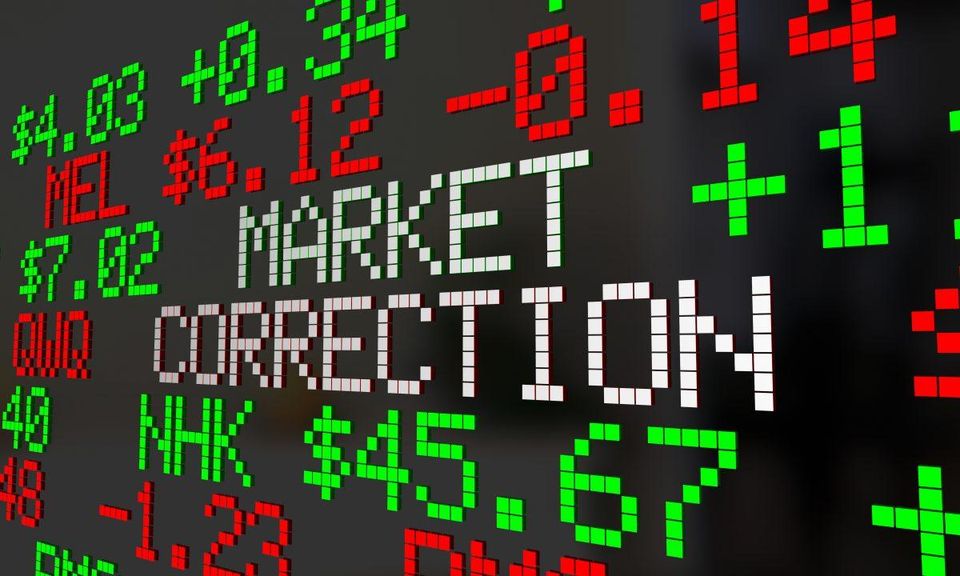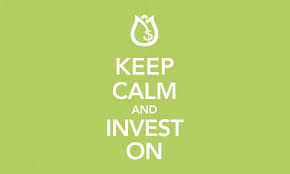
Subscribe to continue reading
Subscribe to get access to the rest of this post and other subscriber-only content.


Subscribe to get access to the rest of this post and other subscriber-only content.
Dear Mr. Market:

A part of us cringes as we succumb to the pressure of having to write about the most recent worrisome headline. Why? It’s sort of like the Kardashians or trashy television personalities in general; the more you talk about it the more it gives some the perception that it’s worth talking about. Now, don’t get us wrong….theses recent headlines aren’t a cause for celebration by any means either but if it’s prompting you to cash out of the market, board up your windows, buy ammo, grow vegetables, or raise chickens in the backyard, you’re repeating an age old mistake. But… “the sky is falling” and “it’s different this time”, right? Not really, but rather it’s once again time to put things in perspective, look at data instead of narrative, facts over fear, and who knows…possibly find opportunities?!
Continue readingDear Mr. Market:
Have we started off the year with enough things to worry about? The 2020s have seen more than any horror script one would ever want to draw up. We’ve had an unprecedented global pandemic, a massive stock market crash, and now a war….and we’re just two years in! We’ve constantly reminded people that the stock market always has a boogey man hiding in the darkness. Even in the proverbial “good times” people have a natural tendency to feel as though the party will end at some point. To that point…they’re partly right; the party doesn’t necessarily end but it certainly takes a break before resuming.
Today’s article will be rather short, even though there is much behind it (and of course more to come as this story develops). We often talk about people having short memories but don’t think that the Ukraine and Russia conflict just started last week. Click here if you need to catch up on a conflict that’s been in flux since February of 2014. The point of our “letter to Mr. Market” today, however, is on what to do with your investments.
Much like Baskin-Robbins ice cream and their 31 flavors, we found a chart that you need to take a look at; it may not be as soothing as an ice cream cone but it can do wonders for how to put things into context. Below we’re sharing a chart that really want you to take some time to zoom in and reflect on each incident. How did you feel during each one? Were there any that you completely blew off or thought they were overhyped? Conversely, which one scared you the most into actually selling?
Continue reading
Dear Mr. Market:
Yesterday seemed like the start of the Great Depression for some pundits and nervous nellies. Fear sells, and negative prognosis appears smarter than positive outlooks for whatever reason. The reality, and key reminder we wish to bring up again, is that the long awaited correction has yet to come. As of this writing, we are literally only -3.91% off of all-time S&P 500 highs in the market.
It should be noted that AAII Bearish Sentiment reading is as high as its been since the last most major S&P 500 sell-off.

Dear Mr. Market:
It’s over.
The “fat lady is singing”, the alarm bells are ringing, and you are literally the last dunce in the room who decided to get into the market at the all-time high. Now Mr. Market shows you what real pain looks like and sells off like nobody has ever imagined.
Let us preface this article by stating it’s worth bookmarking and revisiting for those times when you may be rethinking your investment time horizon or just how much risk you truly are able to take on.
Continue readingDear Mr. Market:
It’s been seven years since we last reviewed the Permanent Portfolio. Please click here to view the original article.
Why do we bring up this article now? Lots has changed but lots has not! More than anything we believe that our current environment has so many unknowns embedded in it after one of the wildest rides in stock market history. We won’t dig into the weeds too much but one could easily make the case that any of the following scenarios could take place over the next year:
Without rehashing all that has transpired in 2020, we believe that being properly allocated and prepared for just about anything that comes our way seems like a wise way to go. The market is almost always unpredictable but there are times when reading the tea leaves and figuring out clear direction is even more difficult; we believe that’s exactly where we’re at right now.
If you didn’t read our old article from 2013, the basis for the Permanent Portfolio strategy is simple at face value: You divide your portfolio into four distinct and fairly uncorrelated asset classes (Cash, Bonds, Gold, and Stocks). Ideally at any point in most economic cycles one of these asset classes will stink it up but the others could compensate and outperform. During prosperous times Stocks should win. When there is inflation a case can be made for Gold. Should the opposite occur and we get deflation you would ideally see long-term Bonds do well. Lastly, during a severe recession Cash is perhaps your best friend. When coupled together you may never hit a home run but this approach can mitigate disaster and still produce modest long-term returns.
Continue readingDear Mr. Market:
We are living in scary times, as investors and as human beings in general. With stock markets cratering and the uncertainty surrounding Coronavirus, it’s hard to remember when things were this bad or uncertain. How and when will things get better?
Regarding the market, there are no absolute rules, but it’s generally agreed investors have to fully capitulate before a bear market downturn can find its low point and eventually turn back the other way. The idea is that all the bad news, expectations and fear have to hit their worst point, so there is finally nothing else to drive the market lower. After that, anything remotely positive or even just “not bad” starts the base for the ensuing bull, and the market can begin climbing again.
The dilemma is that no one sounds an “all-clear” signal to let you know when that point has been reached. Think about the low point of the last bear, March of 2009. President Obama was freshly inaugurated (cause for optimism or pessimism, depending on your political leaning). Chrysler, GM, and Ford were near bankruptcy. Unemployment was climbing. A massive stimulus package had just been signed, but no on knew how effective it might be. Investors wondered if their portfolios would ever recover to where they had been. Those were troubling times, but we all know the market turned sharply upward that month and the bull continued for 11 years. It’s all much more clear looking back in the rearview mirror but at the time it was certainly not so.

Stock Market returns 1,3,5, and 10 years after Worst 1 Days Ever
There is no saying what will bring about capitulation with the current market. In our last column we noted how drawn out the 2000-2002 bear was. Things could get worse before they hit their inflection point. But it will come…if it hasn’t already. Yesterday was the third worst day in the history of the stock market and many threw in the towel. We’ve also advised that panic is never a strategy, and keeping your head as an investor right now is absolutely the right thing to do. One cannot change the past or the fact that this event took on disastrous proportions that nobody could have imagined. This is different than a standard bear market in that it’s more like an unforeseen natural disaster but in this case one that is not specific to some other part of the world; it’s truly global and caught the entire globe flat footed.
Human instinct is to seek shelter when danger is imminent, and that gives us the urge to abandon our better instincts. Sell all your stocks! Go to cash! End the pain! This might provide short-term comfort or relief, but assuming you need some amount of growth to reach your goals, you now have the dilemma of when and how to get back in.
We would advise staying the course, while being prudent. Strategic rebalancing can make sense, but not drastic changes to your allocation. If you have a plan in place that you felt good about during the market highs a month ago, stick to it, and revisit it if needed. Heavyweight boxing champ Mike Tyson famously said, “Everyone has a plan until they get punched in the face.” The market is definitely throwing some serious punches right now. How will you answer the bell?
Lastly, we’re seeing two sets of behaviors right now; one group of people is scrambling to buy toilet paper while another is doing whatever they can to buy stocks. Mark our words in that this will be an inflection point and one where your decisions/behavior today will truly impact where you sit 10 years from now.
Dear Mr. Market:
It’s without question that the recent headlines surrounding the coronavirus have escalated and are rattling everyone’s nerves. The markets have already given back all the early gains of this young year. With natural concern certain questions arise: (1) will this get worse? (2) will it lead to a bear market? , and (3) what should one do right now?
With some of these questions we want to share the viewpoint from our favorite economist, Mr. Brian Wesbury from First Trust.
Monday, fear over the Coronavirus finally gripped investors, as both the Dow Jones Industrial Average and the S&P 500 index fell over 3% – the largest daily declines in two years. These drops wiped out all the gains for the year.
Frankly, it’s amazing to us that the market had been so resilient! Maybe it’s because recent history with stocks and viruses is that markets overreact leading to significant buying opportunities along the way. Over a 38-day trading period during the height of the SARS virus back in 2003, the S&P 500 index fell by 12.8%. During the Zika virus, which occurred at the end of 2015 and into 2016 the market fell by 12.9%. There are other examples, but they all passed, and the market recovered and hit new highs. Continue reading
Dear Mr. Market:
We always chide you for having such a volatile temper. Your unpredictability is both alluring yet often makes the most intelligent person seem like an imbecile. What’s your next move? Who will you reward in 2020 and who will you punish?
As an investor, it’s always hard when the market is volatile. Do what you must to relax – deep breathing, a nice long walk, maybe yoga. Try to ignore the talking heads on the financial news channels. You’ll get through this. Now is not the time for rash action based on emotion.
What’s that you say? You’re not worried? Hasn’t the market been up nicely for the last year?
Of course it has, and that soothed a lot of the fears stock investors had coming off a rough end to 2018. But it actually has been volatile. It’s just that upside volatility naturally feels a lot better than downside! However, both can lead to bad decision making.
Think about how you feel as an investor today, as compared to a year ago. Odds are that last year you were questioning having too much stock exposure, and now you may be wishing you had more. Both extremes can be dangerous. Imagine you gave into your fear during the late 2018 correction, and lightened up on stocks “just to wait for more clarity,” or something along those lines. The S&P 500 zoomed out of the gates in early 2019 and was up over 20% by the end of July! Then it finished up better than 30% for the full year. Giving in to fear and waiting for clarity would have kept you from participating in that upside.
Now imagine you were a disciplined investor, following an asset allocation plan for the long-run. Say your target is 70% stocks / 30% bonds, and you (or your advisor) rebalance toward that allocation at set intervals or deviations. After December 2018, you (or your advisor) would have taken money from bonds and added to stocks, since the 70/30 balance would have been out of whack. Yes, you would have added to stocks during a period of high uncertainty! In hindsight it would have looked like a great timing move, but in reality it would have been simple discipline.
 That brings us to today. The market has been up and worries seem low. Likely your stock allocation has gotten out of whack again, but this time to the upside. What is the prudent investor to do? Again, ignore emotion and follow your plan. If this means selling stocks to rebalance, so be it. Maybe your gut says, “let the winners keep running.” You could do that, but ask yourself how good your gut has been at timing the market in the past.
That brings us to today. The market has been up and worries seem low. Likely your stock allocation has gotten out of whack again, but this time to the upside. What is the prudent investor to do? Again, ignore emotion and follow your plan. If this means selling stocks to rebalance, so be it. Maybe your gut says, “let the winners keep running.” You could do that, but ask yourself how good your gut has been at timing the market in the past.
From an investor psychology standpoint, staying disciplined when things feel comfortable can be a good exercise for when the market inevitably goes a little haywire. Warren Buffett is credited with saying, “Be greedy when others are fearful, and fearful when others are greedy.” Good advice…but if you focus more on discipline than market timing, your decision-making will not be driven by either extreme.
Dear Mr. Market:
Over the past couple of months we’ve had all eyes on you and to state the obvious it’s been a wild ride! With all the recent volatility, the risks (and rewards) of the stock market were on clear display but today we switch gears to a different asset class and share some insight from our friend and guest author, Mr. Brian Chou, Esq.
Owning investment real estate can be a very rewarding and profitable experience, but it can also be a huge headache and a drain on resources. I remember when I purchased my first investment property several years ago, my head was filled with conflicting images of myself sunbathing on my private island and lying penniless in a gutter. The possibilities and the liabilities seemed endless. Continue reading